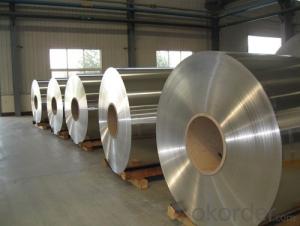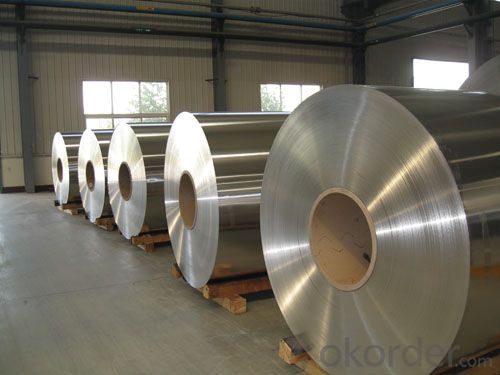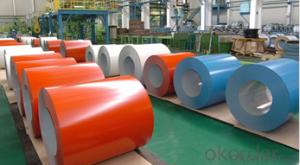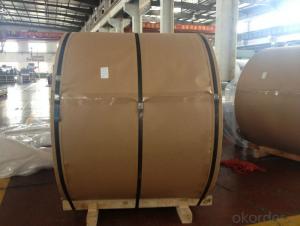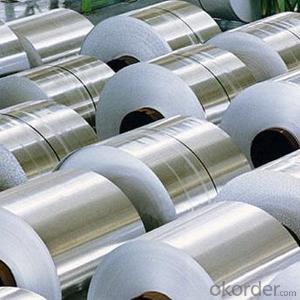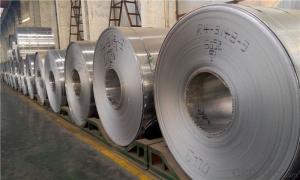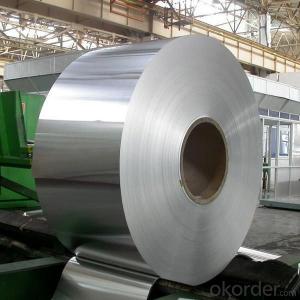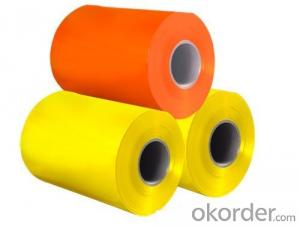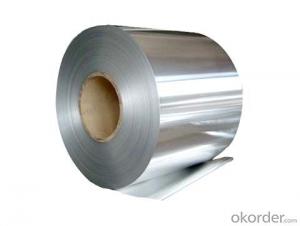1100 H14 Mill Finished Aluminum Coil for Decoration Materials Production
- Loading Port:
- Shanghai
- Payment Terms:
- TT OR LC
- Min Order Qty:
- 1 m.t.
- Supply Capability:
- 60000 m.t./month
OKorder Service Pledge
OKorder Financial Service
You Might Also Like
Specification
Mill Finished Aluminium Coil For Decoration Materials Production
Alloy | 1050, 1060,1100, 3003 3004 3105 3A21 5005 5052 etc |
Temper | O/H12/H14/H1/H18/H32/H34/H36/H38//H111/H112/H116/H321/T6/T651/T3/T351 etc |
Thickness | 0.1mm to 6mm |
Width | 20mm to 3300mm |
Coil weight | 100kgs to 6 tons depends on actual requirement |
Core material | Aluminum or paper |
Coil inner diameter | 75mm, 150mm, 200mm, 300mm, 405mm, 505mm or as required |
Appplication | construction, roofing, decoration, lamping etc |
Package | eye to wall or eye to the wall for aluminum coil with wood pallet (wooded case also available) |
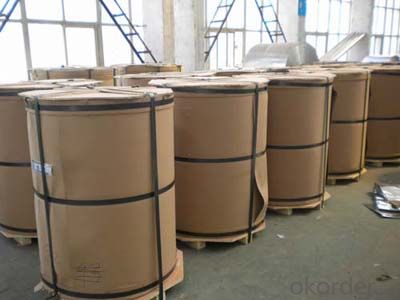
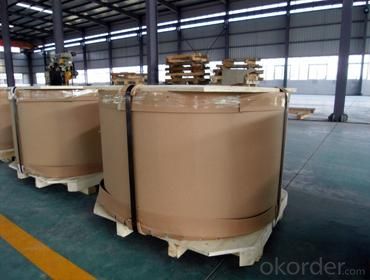
3) Glass curtain wall frame
4) Interior decoration
5) Elevator decoration
6) Signs, nameplate, bags making.
7) Automobile parts material
8) Office and Household appliances: HVAC equipments
9) The consumer electronics: mobile phones, digital cameras, MP3 .etc.
Coating varieties
Polyester Coatings (PE)
PE (polyester) coatings exhibit an excellent combination of hardness, flexibility, flow, appearance, and superior resistance to dirt retention in indoor and outdoor applications. These coatings are highly resistant to abrasion, metal marking, staining, and marring, and require minimal maintenance. Glazetech uses polyester paints which provide excellent colour and gloss retention properties.
Polyvinylidene Fluoride Coatings (PVDF)
PVDF (polyvinylidene fluoride) is a chemical resistant thick film barrier coating commonly used in architectural applications where both excellent appearance and substrate protection must be maintained over a long period of time. This coating is unaffected by most chemicals and solvents and has excellent wear and abrasion resistance. PVDF also has a high dielectric strength, excellent resistance to weathering and the ability to self extinguish.
FAQ
--Q: Do you provide free samples?
--A: Yes, free samples will be sent to you on freight at destination.
--Q: Can I get your latest products catalogue?
--A: Yes, it will be sent to you in no time.
--Q: What is the MOQ?
--A: 2 tons
--Q: What are your payment terms?
--A: We accept L/C, T/T.
--Q: What kinds of alloy can you supply?
--A: 1000 series: 1050, 1060, 1070, 1100, 1145, 1200
3000 series: 3003, 3004, 3105, 3104
5000 series: 5052, 5083, 5754, 5182
6000 series: 6061, 6063, 6062, 6063
8000 series: 8011, 8021
--Q: What’s the coating of top side?
--A: PVDF and PE coating
--Q: What kinds of temper can you supply?
--A: O-H112: O,H12,H14,H16,H18,H22,H24,H26,H,32,H34,H111,H112
T3, T4, T6
- Q: Two days ago, my cocker spaniel ate most of a small aluminum bread pan--the disposable kind you can buy in the supermarket. The pieces I picked up when I discovered what he'd done were sharp, so I called the vet (right before closing), who recommended just keeping an eye on him for nausea, diarrhea, etc. The next morning I brought the dog and he showed no discomfort, but the vet put him on an antibiotic (esp. for gastric problems) just in case. It's been 48 hours, and the dog's still happy and eating and drinking, and when we go for a walk, his poo is fine (yep; I examine it!) ... if he's passed the aluminum, it must have been in the back yard when he was out on his own, and not on a walk. However, I'm still very anxious. At what point can I draw a sigh of relief? Thank you!
- Aluminum will pass just like food. It will empty from the stomach and go through the digestive tract. Hopefully he chewed up the pieces so that they are small and are at no risk of cutting his intestines or bowels. But if he is not yet showing discomfort, all should be well. You made the smart choice and called the vet, and if they do not seem too worried you shouldn't be either unless your pooch begins acting differently or seems to be in discomfort.
- Q: This question asks for a comparison of the pros and cons associated with the use of aluminum coils.
- <p>Aluminum coils offer several advantages, including high thermal conductivity, which makes them efficient for heat transfer applications. They are lightweight and corrosion-resistant, which enhances their durability and reduces maintenance needs. Additionally, aluminum is a cost-effective material compared to other metals like copper. However, there are disadvantages such as lower strength compared to steel, which may limit its use in high-stress applications. Aluminum also has a higher coefficient of expansion, which can lead to issues in precision applications. Lastly, while it is recyclable, the recycling process can be energy-intensive.</p>
- Q: I planned on making heart shaped pancakes for Valentine's day - is it ok to use aluminum foil as the mold for it? If so, how should I go about it?
- If you are using a frying pan on a gas stove - yes. I fold tin foil into a strongish ribbon then form the shape I want: hearts, gingerbread men, etc. Make sure the pan is fairly warm before you put the tin foil shape in remove the shape as soon as the pancake is set, but before you flip it. You can trim the little splashes before serving. HOWEVER - there are reusable shapes available at many kitchen supply stores. They are not very expensive are permanent additions to your kitchen.
- Q: Are aluminum coils suitable for gutter systems?
- Yes, aluminum coils are suitable for gutter systems. Aluminum is a popular choice for gutter systems due to its durability, lightweight nature, and resistance to rust and corrosion. It is a cost-effective option that can withstand harsh weather conditions and has a long lifespan. Additionally, aluminum coils are easy to install and maintain, making them an ideal choice for gutter systems.
- Q: wikipedia says welding aluminum by means of stick welding is possible but i have always been told TIG is the only way to weld aluminum. what do i need in order to stick weld aluminum? BTW i have a Lincoln Electric AC 225 Stick Welder
- aluminum stick rods are available in various electrode thickness ranges and can be used above 1/8 thickness with an AC machine. The fact that you have an electric machine makes it easier bc the amps and volts stay more consistant than a gas powered unit. I prefer to warm the base metal to about 125 to 150 degrees F prior to welding. Clean the surface area with a STAINLESS STEEL wire brush to remove the oxidation, strike the arc in the normal pattern and then lay the rod back almost parallel with the material and cross arc or long arc against the base metal to allow the material to heat up but not overheat...the weld metal will carry across the arc and drop onto the melted base metal. Good Luck
- Q: How are aluminum coils used in the construction industry?
- Aluminum coils are widely used in the construction industry for various purposes such as roofing, siding, and insulation. These coils are typically formed into sheets or panels which are then used to create durable and lightweight structures. Additionally, aluminum coils are often employed in the manufacturing of gutters, fascia, and soffit systems, enhancing the overall aesthetics and functionality of buildings. Due to their corrosion resistance and high strength-to-weight ratio, aluminum coils are favored for their longevity and ease of installation, making them a popular choice in the construction industry.
- Q: What are the different alloy compositions used in aluminum coils?
- Aluminum coils utilize various alloy compositions, each with distinct properties and applications. Let's explore some of the commonly employed compositions: 1. The 1000 series alloys are nearly pure aluminum, boasting exceptional ductility and corrosion resistance, with a minimum aluminum content of 99%. These alloys find utility in scenarios demanding formability and efficient electrical conductivity, such as electrical wiring and packaging. 2. Manganese is present in small quantities within the 3000 series alloys, rendering them sturdier and more corrosion-resistant than their 1000 series counterparts. Cooking utensils, chemical equipment, and decorative trim are among the applications where these alloys are frequently employed. 3. Magnesium serves as the primary alloying element in the 5000 series alloys, significantly enhancing their strength and hardness. Renowned for their impressive resistance to corrosion, these alloys are commonly utilized in marine environments, as well as the automotive and aerospace industries. 4. The 6000 series alloys are combined with magnesium and silicon, leading to improved strength, heat treatability, and weldability. Architectural and structural components, transportation, and electrical conductors often rely on these alloys. 5. Zinc is the primary alloying element in the 7000 series alloys, providing them with remarkable strength and toughness. These alloys are frequently employed in high-stress environments, including aircraft structural components and sporting equipment. It is crucial to acknowledge that numerous alloy compositions are employed in aluminum coils, each tailored to specific requirements and applications. The choice of alloy composition hinges on factors such as desired strength, corrosion resistance, formability, and cost considerations.
- Q: How are aluminum coils processed for specific applications?
- Aluminum coils undergo a series of processes to tailor them for specific applications. The first step is the selection of high-quality aluminum alloy, which determines the coil's properties. Once the alloy is chosen, it is melted and cast into large ingots. After cooling, the ingots are rolled between heavy rollers to reduce their thickness and form long, continuous aluminum coils. Next, the coils are subjected to various surface treatments to enhance their performance and appearance. One common treatment is cleaning, which removes any impurities or contaminants from the coil's surface. This is typically done through chemical or mechanical methods. Another treatment is chemically etching the surface to create a specific texture or pattern, which can improve adhesion or aesthetics. To further enhance the coil's properties, it may undergo processes like heat treatment or annealing. Heat treatment involves heating the coil to a specific temperature and then rapidly cooling it to modify its mechanical or physical properties. Annealing, on the other hand, involves heating the coil to a predetermined temperature and then slowly cooling it to relieve internal stresses and improve its ductility. Coils destined for specific applications may also undergo additional processes. For instance, if the coil is intended for use in the automotive industry, it may be subjected to lubrication or coating processes to reduce friction or improve corrosion resistance. If it is meant for electrical applications, it might undergo surface treatments to enhance its conductivity or insulation properties. Finally, the coils are usually cut into desired lengths and packaged for transportation. This can be done through various methods like slitting, shearing, or sawing, depending on the application and customer requirements. Overall, the processing of aluminum coils for specific applications involves a combination of casting, rolling, surface treatment, heat treatment, and additional processes to enhance their performance, appearance, and suitability for their intended use.
- Q: Are aluminum coils suitable for beverage can manufacturing?
- Yes, aluminum coils are suitable for beverage can manufacturing.
- Q: Can aluminum coils be used in the production of aluminum foil?
- Yes, aluminum coils can be used in the production of aluminum foil. Aluminum coils are typically made by rolling ingots of aluminum between heavy rollers to create thin, flat sheets. These coils can then be further processed to create aluminum foil. The coils are unwound and fed through a series of rolling mills which gradually reduce the thickness of the metal until the desired thickness for aluminum foil is achieved. The foil is then cut into sheets or rolls for packaging and distribution. Aluminum coils provide a cost-effective and efficient way to produce large quantities of aluminum foil.
Send your message to us
1100 H14 Mill Finished Aluminum Coil for Decoration Materials Production
- Loading Port:
- Shanghai
- Payment Terms:
- TT OR LC
- Min Order Qty:
- 1 m.t.
- Supply Capability:
- 60000 m.t./month
OKorder Service Pledge
OKorder Financial Service
Similar products
Hot products
Hot Searches
Related keywords
